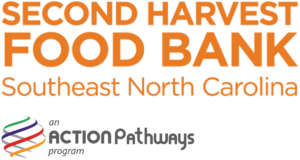How It Works
Every year, the US throws away one-third of all the food it produces — wasting 133 billion pounds of food. And 10% of that food is lost at the grocery stores, restaurants, and vendors that sell it.
The Retail Store Donation Program helps secure perishable and non-perishable food items from retail stores across the Food Bank’s service area. By working with grocery stores and other food retailers in our community, we are able to ensure healthy food isn’t wasted.
On a regular basis you will find Second Harvest Food Bank trucks on their way to various food retailers to pick up items that fall below first quality retail standards but provide food banks with a reliable source of food and household products for those living in poverty.
These food items may include discontinued items, product samples, perishable product beyond retail sales that will not affect safe consumption, cosmetic or production errors and more.
Our Retail Store Donation Coordinator works one-on-one with store managers and staff to educate on the benefits of donating excess food to the Food Bank and how to properly store, save and donate to the Food Bank.
The Retail Program is an important component to providing hunger relief, and we would not be able to accomplish our mission without these partnerships.
Retail Partners
Every week, Food Bank staff or partner agencies pick up donations from area retailers, including these partners.
- FOOD LION
- WALMART SUPERCENTER
- WALMART NEIGHBORHOOD MARKET
- SAMS CLUB
- TARGET
- ALDI
- HARRIS TEETER
- SAVE-A-LOT
- PUBLIX
- FRESH MARKET
- SPROUTS
Retailers and Manufacturers: A Partnership for Hunger Relief
There are many reasons that retailers and manufactures choose to donate to Second Harvest Food Bank! There are also some myths that keep others from doing their part, primarily because they are not informed and need more information. Let’s take a closer look…
Why Donate?
Feed People: While many may not realize the grave disparities that exist in our own communities, people struggle with hunger in every county and congressional district in North Carolina. These people are our neighbors, our friends, our co-workers, and our children – 1 in 4 children to be exact.
Prevent Food Waste: Food waste is a major global issue. In the United States alone, it’s estimated that up to 40% of food produced ends up in the garbage. The negative impacts are multifold: Not only are there many hungry people in need of said food, but throwing away this food is also major waste of resources required for food production and transportation.
Help Our Planet: Food that ends up in landfills contributes to greenhouse gas emissions, contributing to climate change. Rotten food accounts for 34% of all methane emissions and is 20 times more damaging to the planet than CO2.
Tax Benefits: There are potential tax benefits for companies that donate food. The Federal Government has recognized the importance of food donation and provides tax deductions to incentivize businesses to donate food. As of December 2105, all businesses including C-corporations, S-corporations, limited liability corporations (LLC), partnerships and sole proprietorships are eligible for an enhanced tax deduction that exceeds the property’s basis for donated food. Businesses that are eligible for the tax deduction must meet certain requirements to receive the enhanced deduction. Businesses that do not receive these enhanced deductions, can still claim a general tax deduction for donating property, including food, in the amount of the property’s basis.
Donation Myths Dispelled:
Liability: Some retailers and manufacturers are reluctant to give due to misconceptions regarding liability. Many vendors mistakenly believe they’ll get sued for providing food that gets somebody sick, even if they think that food is safe. The vendors may decide giving away their leftovers isn’t worth the legal risk.
What these vendors may not know (or fully understand) is that in 1996, Congress passed the Bill Emerson Good Samaritan Food Donation Act, thus protecting good faith food donors from civil and criminal liability. The law specifically protects individuals, corporations, wholesalers, caterers, farmers, restaurateurs, and others from liability for donating food in good faith.
Logistics: Some retailers may feel that they do not have the space to store the product until a pick up can be made. Second Harvest Food Bank has trucks and drivers on the road Monday through Friday, some mornings as early as 6 am. Our drivers work tirelessly to ensure that they arrive at each retail location around the same time each day. Additionally, our retailer partners have the option to choose how frequently they would like a pick up to be made.
In addition to our SHFB Drivers, we have over 260 partner hunger relief agencies. Many of these agencies have undergone additional training to be included as a member of our Retail Donation Program. This means, that many of our partner agencies that are located near retail partners are able to pick up donations themselves and get food to the tables of those in need even faster! This allows for increased pick ups for our retailers and fresher food for our families in need.
How To Become a Partner:
Member Agencies, Retail Stores, or Manufacturers interested in partnering with Second Harvest Food Bank of Southeast North Carolina can contact David Griffin at 910-485-6923 or send an email to david.griffin@actionpathways.ngo.

